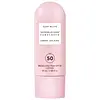What's inside
What's inside
 Key Ingredients
Key Ingredients

 Benefits
Benefits

 Concerns
Concerns

 Ingredients Side-by-side
Ingredients Side-by-side

Homosalate 8.5%
Skin ConditioningEthylhexyl Salicylate 5%
UV AbsorberOctocrylene 8.5%
UV AbsorberZinc Oxide 12.1%
Cosmetic ColorantWater
Skin ConditioningCaprylic/Capric Triglyceride
MaskingPropanediol
SolventGlycerin
HumectantCetearyl Olivate
Polyhydroxystearic Acid
EmulsifyingEthylhexyl Methoxycrylene
Skin ConditioningPotassium Cetyl Phosphate
EmulsifyingLauroyl Lysine
Skin ConditioningPhenyl Trimethicone
Skin ConditioningDimethicone
EmollientSorbitan Olivate
EmulsifyingInulin Lauryl Carbamate
Emulsion StabilisingXanthan Gum
EmulsifyingTriethoxycaprylylsilane
1,2-Hexanediol
Skin ConditioningCaprylyl Glycol
EmollientHydroxyacetophenone
AntioxidantPolyester-8
Skin ConditioningDiethylhexyl Syringylidenemalonate
Skin ProtectingCetearyl Alcohol
EmollientMenthone Glycerin Acetal
RefreshingLactic Acid
BufferingArachidyl Alcohol
EmollientChlorphenesin
AntimicrobialCitrullus Lanatus Fruit Extract
Skin ConditioningNiacinamide
SmoothingSodium Stearoyl Glutamate
CleansingCoco-Glucoside
CleansingBehenyl Alcohol
EmollientTrisodium Ethylenediamine Disuccinate
Aloe Barbadensis Leaf Juice
Skin ConditioningSilica
AbrasiveDimethicone Crosspolymer
Emulsion StabilisingArachidyl Glucoside
EmulsifyingSodium Citrate
BufferingParfum
MaskingSodium Hyaluronate
HumectantMagnesium Aspartate
Skin ConditioningZinc Gluconate
Skin ConditioningPhenoxyethanol
PreservativeCopper Gluconate
Skin ConditioningHomosalate 8.5%, Ethylhexyl Salicylate 5%, Octocrylene 8.5%, Zinc Oxide 12.1%, Water, Caprylic/Capric Triglyceride, Propanediol, Glycerin, Cetearyl Olivate, Polyhydroxystearic Acid, Ethylhexyl Methoxycrylene, Potassium Cetyl Phosphate, Lauroyl Lysine, Phenyl Trimethicone, Dimethicone, Sorbitan Olivate, Inulin Lauryl Carbamate, Xanthan Gum, Triethoxycaprylylsilane, 1,2-Hexanediol, Caprylyl Glycol, Hydroxyacetophenone, Polyester-8, Diethylhexyl Syringylidenemalonate, Cetearyl Alcohol, Menthone Glycerin Acetal, Lactic Acid, Arachidyl Alcohol, Chlorphenesin, Citrullus Lanatus Fruit Extract, Niacinamide, Sodium Stearoyl Glutamate, Coco-Glucoside, Behenyl Alcohol, Trisodium Ethylenediamine Disuccinate, Aloe Barbadensis Leaf Juice, Silica, Dimethicone Crosspolymer, Arachidyl Glucoside, Sodium Citrate, Parfum, Sodium Hyaluronate, Magnesium Aspartate, Zinc Gluconate, Phenoxyethanol, Copper Gluconate
 Reviews
Reviews

Ingredients Explained
These ingredients are found in both products.
Ingredients higher up in an ingredient list are typically present in a larger amount.
Octocrylene protects skin from sun damage. It absorbs UV-B with peak absorption of 304 nm. It is a common sunscreen ingredient and often paired with avobenzone, a UVA filter. This is because octocrylene stabilizes other sunscreen ingredients by protecting them from degradation when exposed to sunlight. Octocrylene is a photostable ingredient and loses about 10% of SPF in 95 minutes.
Octocrylene also acts as an emollient, meaning it helps skin retain moisture and softens skin. It is oil-soluble and hydrophobic, enhancing water-resistant properties in a product.
Those who are using ketoprofen, a topical anti-inflammatory drug, may experience an allergic reaction when using octocrylene. It is best to speak with a healthcare professional about using sunscreens with octocrylene.
The EU allows a maximum of these concentrations:
Learn more about OctocrylenePhenoxyethanol is a preservative that has germicide, antimicrobial, and aromatic properties. Studies show that phenoxyethanol can prevent microbial growth. By itself, it has a scent that is similar to that of a rose.
It's often used in formulations along with Caprylyl Glycol to preserve the shelf life of products.
Zinc Oxide is a mineral broad-spectrum UV filter; it is the broadest UVA and UVB reflector approved by the FDA. It also has skin protectant and skin soothing properties.
Zinc oxide is one of the most effective broad-spectrum UV filters. It protects against UVB, UVAII, and UVAI. In comparison to its counterpart titanium dioxide, zinc oxide provides uniform and extended UVA protection.
Another great benefit? This ingredient is highly photostable so it won't degrade easily under sunlight.
A common myth is that mineral UV filters are widely believed to primarily reflect UV light.
However, modern research shows titanium dioxide absorbs UV radiation like chemical filters (~95% absorption & 5% reflection).
Zinc oxide has great skin soothing properties so you'll likely find this in sunscreens formulated for sensitive skin or babies/children. It is unlikely to cause "eye sting" like other sunscreen ingredients.
Regulatory agencies consider zinc oxide to be non-toxic and safe. It has also been shown to not penetrate the skin.
Unfortunately, this ingredient does leave a visible white cast. This is why mineral sunscreens are often less cosmetically elegant than chemical or hybrid ones.
In cosmetics, zinc oxide can be found in both non-nano and nano-sized forms. The nano version is used to reduce white cast and improve the texture of sunscreen formulas.
There are ongoing concerns surrounding nano-zinc oxide's impact on marine ecosystems and whether it can be absorbed into skin.
Regarding marine ecosystems and coral reefs, there is no conclusive evidence that any form of zinc oxide (or any other sunscreen ingredients) will cause harm. The science is still developing but many consumers are keeping a close eye on this issue.
Please note, many destinations have reef-safety sunscreen rules. For instance, the U.S. Virgin Islands advises all visitors to use non-nano mineral sunscreens.
There has also been some stir about whether micronized or nano zinc oxide has potential photoxicity and absorption through the skin/lungs.
An in-vitro (done in a test tube or petri dish) study demonstrated micronized zinc oxide to have potential phototoxicity. There's no need to fret; the EU Commission's Scientific Committee on Consumer Safety has stated, "The relevance of these findings needs to be clarified by appropriate investigations in vivo." Or in other words, further studies done on living organisms are needed to prove this.
Current research shows zinc oxide nanoparticles do not penetrate intact or sunburned skin. They either remain on the surface or in the outermost layer of dead skin (stratum corneum).
Zinc oxide is one of only two classified mineral UV filters with titanium dioxide being the other one.
Fun fact: Zinc has been used throughout history as an ingredient in paint and medicine. An Indian text from 500BC is believed to list zinc oxide as a salve for open wound. The Ancient Greek physician Dioscorides has also mentioned the use of zinc as an ointment in 1AD.
Learn more about Zinc Oxide